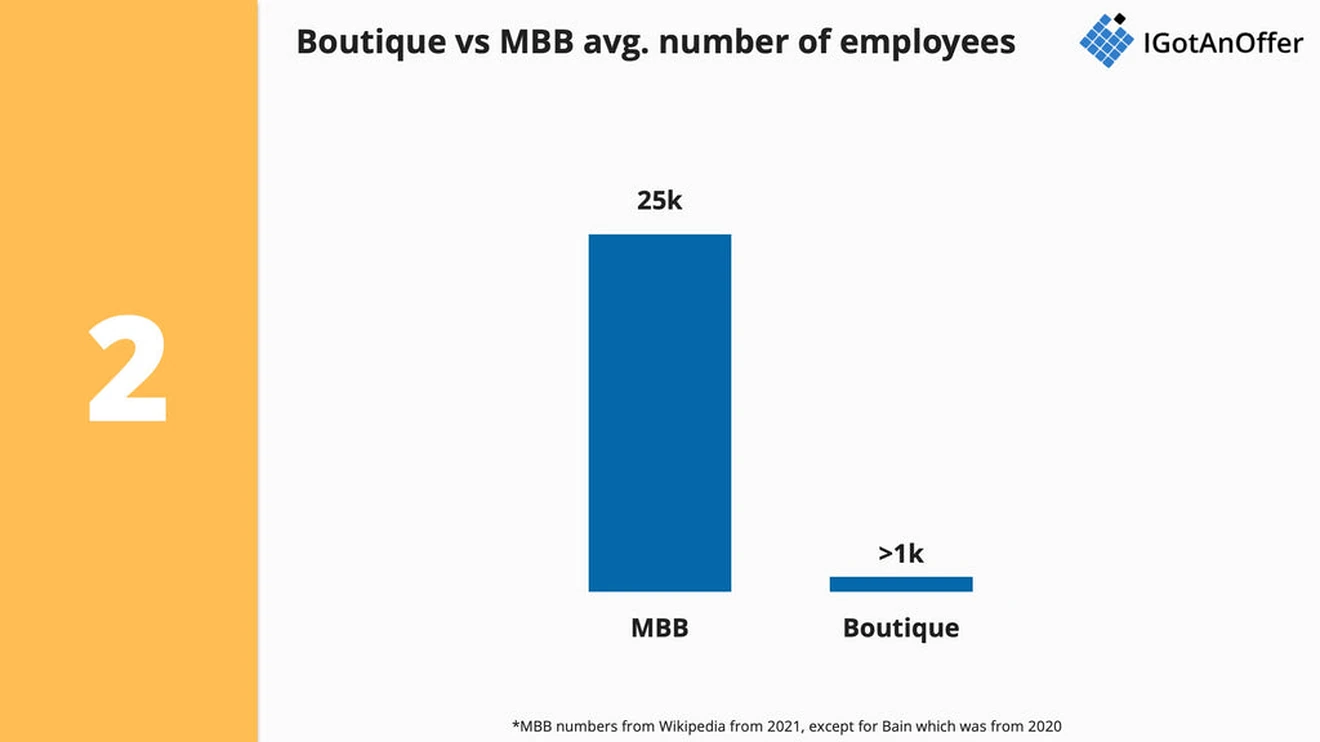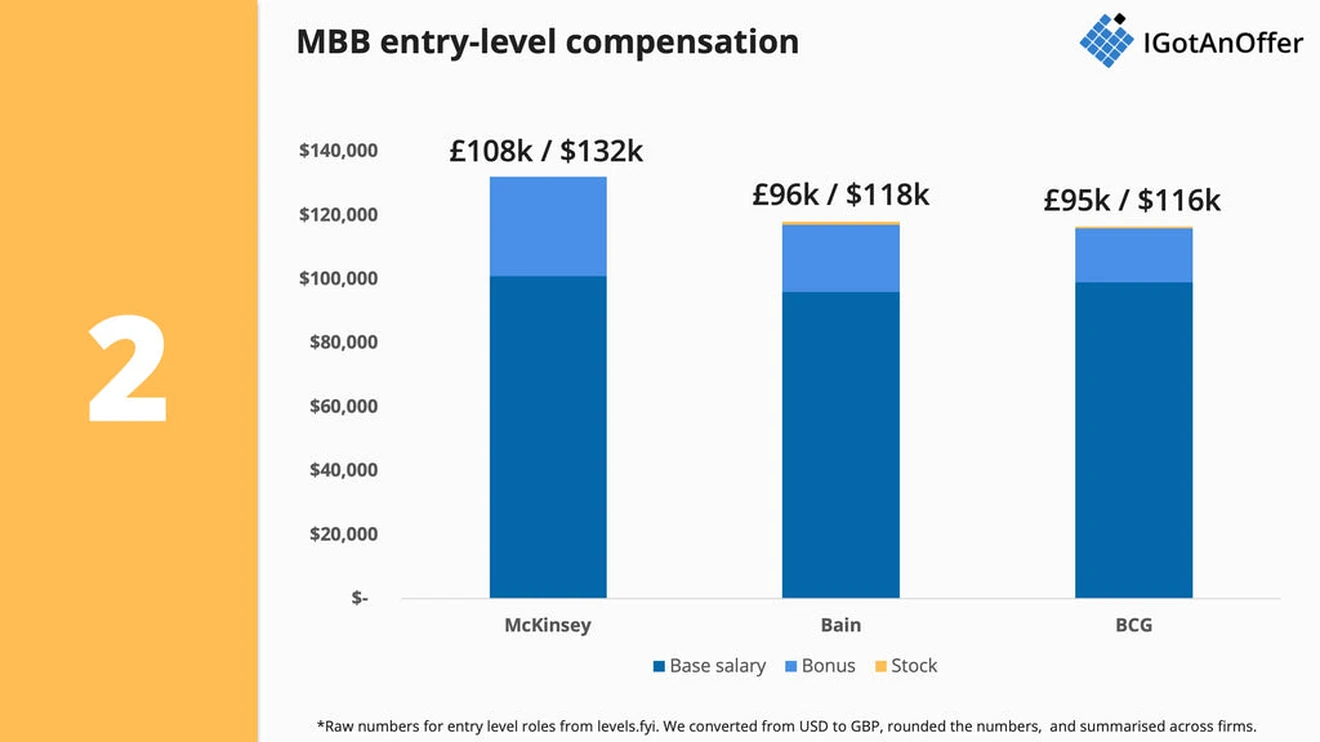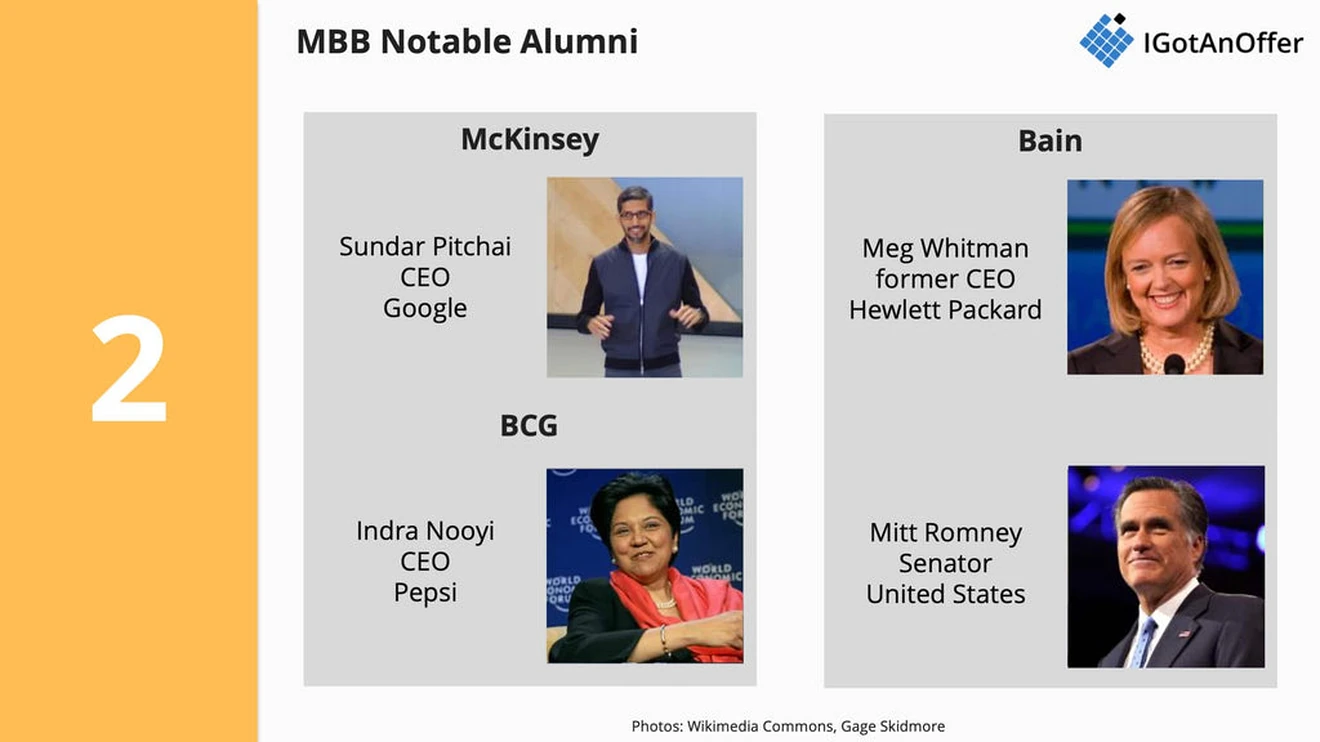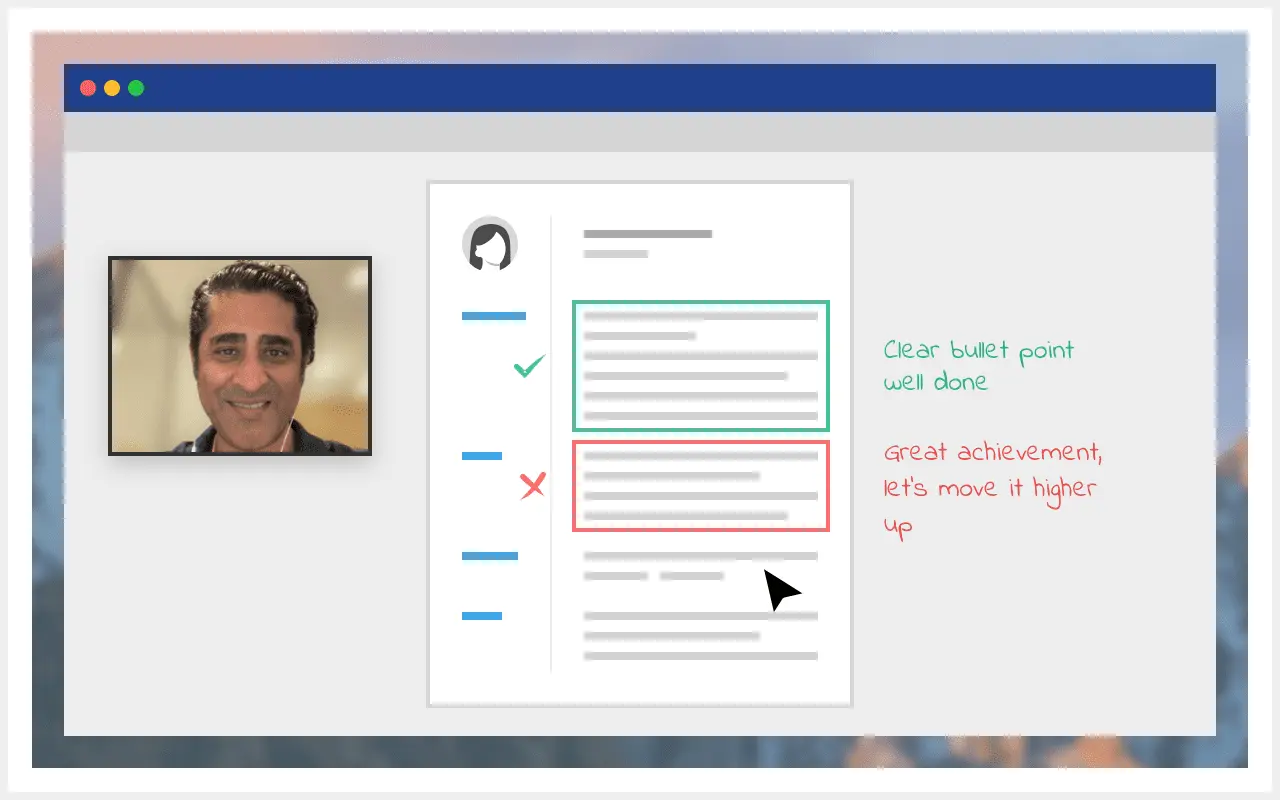Today we're going to explain the differences between boutique consulting firms and MBB firms, and how you can move from a boutique to an MBB firm as a consultant.
We've helped over 8,000 candidates prep for their consulting interviews, including Karthik who got an offer at McKinsey.
And one of the first things you'll want to know about these companies is that boutique and MBB firms often do fundamentally different types of work, but more on that later.
Here's an overview of what we'll cover:
- What are boutique consulting firms?
- Boutique vs. MBB differences
- Should you work at a boutique or MBB firm?
- Moving from a boutique firm to MBB
Let's get started!
Click here for a resume review with an ex-MBB consultant
1. What are boutique consulting firms?
Boutique consulting firms are small consultancies that typically have a deep specialisation in a specific industry or skillset. Examples of boutique firms include The Bridgespan Group and Putnam, which specialise in the non-profit and healthcare sectors, respectively.
Boutique consulting firms typically have less than 1000 employees, and are often limited to one (or a few) offices, which can mean that they only serve clients in a particular region. To help you get a better sense for the types of firms that are considered boutiques, here is a list of the top 10 boutique consultancies that were recently rated by Vault.
2. Boutique vs. MBB differences
2.1 Size
You probably already know that the MBB firms are larger than boutique firms, but to give you a sense for how much bigger they are, here’s a comparison of their average number of employees:

Number of employees is probably the most straightforward way to compare the size of these firms.
However, you can also consider the revenue generated by these different types of firms. On the one hand, you have MBB firms that generate an average of $11bn per year (according to the data reported for each firm on Wikipedia).
And on the other hand you have boutique firms, which generate significantly less total revenue. For example, The Bridgespan Group generated $118m in 2020, which is nearly 100x lower than the MBB average.
And there are many boutiques that are much smaller than this. For example, Putnam Associates generated $38m in 2021, and there are other boutiques that generate less than $5m in revenue per year. This goes to show, there is a lot of variation in the relative size of boutique firms.
It's also worth mentioning that there is another layer of consulting firms that exist between boutique and MBB firms when it comes to size. For example, firms like Kearney and Oliver Wyman are larger and more widely recognized than boutiques, but they don't quite have the head count or revenue of an MBB firm.
2.2 Projects
Another key difference between boutique and MBB firms are the types of projects that they do. The MBB firms are huge, and they tend to be seen as “generalist” consulting firms.
Whereas boutique firms typically have a more narrow focus, and they often specialise in particular types of projects.
One way to think about this is that an MBB firm may work on advisory projects for ANY of the Fortune 500 companies.
But a boutique would focus on clients in a particular industry or those with a particular business problem. For example, like Putnam, some boutiques would focus on healthcare clients.
And other boutiques focus on a specific type of consulting work. For example, the Ignyte Group may take on a variety of clients, but they focus primarily on digital transformation work.
The types of projects that are available is also one of the key differences between the MBB and Big 4 firms.
2.3 Salaries
MBB firms are famous for lucrative compensation packages. Compensation does vary depending on your role, level of experience, location, etc. But generally, if you get a job offer from McKinsey, BCG, or Bain, you can expect to make very good money.

And generally speaking, MBB compensation is at least a little better than compensation at boutique firms.
However, there is a lot more variation in compensation between boutique firms than there is between the MBB firms. In some cases, you may even be able to get better compensation at a boutique than the typical pay at an MBB firm. For example, the average compensation for a Consultant at the Ignyte Group is about £99k, which puts it slightly above BCG and Bain.
On the other hand, there are boutiques where the compensation is significantly lower than what you’d find at an MBB. For example, the average compensation for an Associate Consultant at The Bridgespan Group is about £54k.
It’s also worth mentioning that some boutiques have unique compensation “add ons”. For example, ghSmart has a variable compensation system where consultants can earn more by taking on additional billable work. This allows their people to earn more money above and beyond their normal base salary and bonus.
2.4 Prestige and exit opportunities
Another interesting thing to consider is the prestige and exit opportunities that come along with a job at an MBB or boutique consulting firm.
And this one is fairly simple. If prestige is important to you or if you want to work up to a competitive executive role later in your career, then an MBB position will almost always be better for you.
To be fair, there are boutiques that are famous for having deep expertise in a particular area. These can be prestigious and can also offer good exit opportunities. And if your goal is to become an industry recognized expert in something, then you might also be able to find a boutique that is better aligned with that long-term goal.
However, the brand recognition of working at McKinsey, BCG, or Bain is really tough to beat when it comes to prestige. These 3 firms are consistently rated as the top 3 most prestigious consulting firms.
And the MBB exit opportunities can be pretty incredible. For example, here is a brief snapshot of notable MBB alumni:

2.5 Hours and work / life balance
If you’re considering a career at an MBB or boutique, it’s also important to consider your desired work/life balance.
MBB firms are known to have long hours, though your exact work/life balance situation will vary significantly depending on your specific client, project, and manager/partner.
Many boutiques will offer work/life balance advantages over MBB firms, although that won’t always be the case. Here are a few reasons why a boutique could provide a better work/life balance than an MBB firm:
- Boutiques are often more localised, which could mean less time spent travelling
- Boutiques are often more specialised, which could mean less of a learning curve when ramping up on new projects, and less work hours as a result
- MBB firms tend to have a culture of fast-paced work and long hours: this will be true of some boutiques, but other boutiques will have more relaxed cultures
Hopefully this gives you an idea for some of the ways that boutiques and MBB firms vary when it comes to work/life balance. But as we covered earlier, there is a lot of variation to this depending on the company, project, client, and leadership that you’re dealing with.
3. Should you work at a boutique or MBB firm?
Now, if you’re considering a new consulting position, you’ll need to ask yourself whether a boutique or an MBB firm is right for you.
An MBB role might seem like the obvious choice, but it’s not for everybody.
Each person has different career and personal goals, and depending on yours, a boutique may be a better fit for you than an MBB firm.
If that sounds outrageous to you, just read this interesting forum thread where multiple people have shared stories about choosing a boutique over an MBB firm. The main reasons given for choosing boutiques in this thread were:
- Fitting in better at the boutique
- They intended to work in consulting long-term
- Fewer hours / less travel
- Specialisation in the area they were most interested in
If those points resonate with you, then you might prefer working at a boutique over an MBB firm.
On the other hand, if you’re highly motivated by prestige, high pay, and incredible exit opportunities, then it’s really tough to beat the MBB firms in those areas.
And if you’re currently at a boutique firm and would like to make the move to an MBB, let’s talk about your chances.
4. Moving from a boutique to MBB
4.1 Is it possible?
Given the famously rigorous interview process at MBB firms, you might wonder if it’s even possible to move from a boutique consulting firm to an MBB firm.
Generally, it’s possible to move from a boutique to an MBB firm. However, MBB firms are extremely selective, and it’s difficult to get an offer despite having prior consulting experience. But, there are ways you can increase your chances, such as specialising in an area where an MBB firm is scaling.
4.2 How to get into MBB from a boutique
You may already be familiar with the basic MBB interview process. But if not, you can learn about it for each firm using the free guides below:
There are also a few things you can do outside of the normal interview prep in order to increase your chances of moving from a boutique to an MBB.
Let’s look at a few tactics more closely:
Strategy 1: Go get an MBA
If you currently work at a boutique and haven’t done an MBA yet, getting an MBA at an MBB target school can go a long way in helping your application to get noticed.
MBB’s often recruit from a set of their favourite “target” schools, and if you are enrolled at one of them, that will significantly increase your chances of getting an interview and ultimately an offer. For example, Stanford is a target school and you can learn more about what it takes to gain admission in our Stanford GMAT guide.
Another reason this strategy works is that it can be hard to get your application noticed as an experienced hire, especially if you’re applying outside of the firm’s normal recruiting cycles.
As an MBA applicant, you would fit more naturally into the recruitment processes typically used by MBB firms. And this would remove some obstacles for you, and would probably also give you more opportunities to meet and speak directly with representatives from MBB firms.
Doing an MBA is a big commitment, but if you really want to land an MBB role, you may need to take a long-term approach.
Strategy 2: Specialise where MBB is weaker
The MBB firms are growing their offering of consulting services. They don’t just do strategy consulting anymore, they also provide a variety of other services, including some types of consulting where they are playing “catch up” with other consultancies.
For example, according to Vault’s rankings Accenture and IBM are both ranked above all of the MBB firms for IT strategy consulting. Accenture and IBM aren’t boutique firms, but this just illustrates how you can increase your chances of getting into MBB by specialising in a type of consulting where the MBB firms are weaker or are trying to grow their presence.
At the end of the day, the MBB firms need people who are experts in the industries and skillsets that their clients need. If you can align your own skills with an area where an MBB firm is weaker, then you’ll give yourself an edge over other candidates.
Strategy 3: Connect with MBB people
When you submit your application to an MBB firm, that does NOT guarantee that it will be seen by the people within the firm who would most value your experience and qualifications.
The MBB firms get flooded with applications every year, and only a small percentage of applicants even get an interview.
So, to get noticed it helps to make connections within the firm.
This is valuable for a few reasons.
First, if you’re able to connect with someone who is involved in the area where you want to work, then they may be able to influence your hiring decision and help you to join their team directly.
In addition, MBB firms have internal referral processes that allow current employees to recommend new candidates for consideration. Referrals can help your application get noticed, even if the person who refers you isn’t in the same industry as you.
Strategy 4: Cast a wide net
Roughly 1% of all applicants to McKinsey, BCG, and Bain ultimately get an offer. To put that number into perspective, that's roughly 3X lower than Harvard's lowest annual acceptance rate in the last 20 years, which was 3.19%.
So, even if you are an exceptional consultant or student, your chances of landing an offer at an MBB firm are really small.
Don't let that discourage you though! You should still go for it, and you can use the other strategies we've mentioned above to help increase your odds.
With that said, applying to top consultancies is a little bit of a numbers game.
So, it's probably a good idea to cast a wide net, and apply for a few consulting firms outside of the MBB. This will increase your chances of landing an offer, and upon doing the research, you may even find other firms to be a better fit for your goals and lifestyle.
Strategy 5: Optimise your application to get noticed
The majority of MBB applicants get eliminated before even getting an interview, during the resume and cover letter screening.
So, it's critically important for your application to stand out. And you'll need to understand which experiences to emphasize, what to cut from your resume, and how to write a cover letter that MBB recruiters will find compelling.
To help with this, you can use our free consulting resume guide and consulting cover letter guide.
But if you really want to maximise your chances of getting an interview invitation, then it's extremely useful to get feedback on your documents from an experienced ex-interviewer from your target firm.
And here's the good news: we have a whole team of ex-MBB recruiters and interviewers who are ready to give you feedback on your resume and cover letter. You can browse available coaches and book a review session here.














